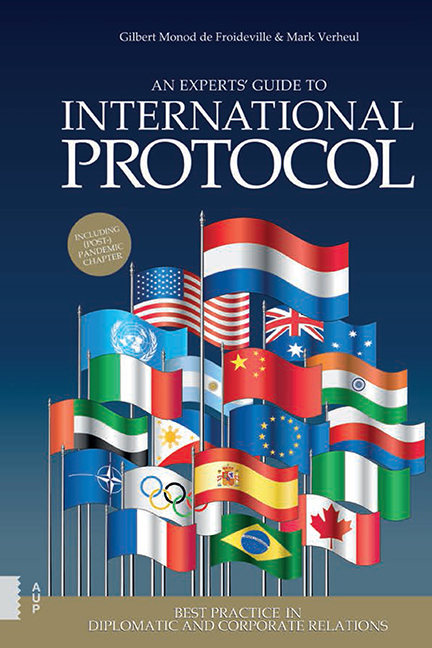Book contents
- Frontmatter
- Contents
- Preface to the original edition by His Royal Highness Prince Carlos de Bourbon de Parme
- Prologue
- Acknowledgements
- 1 International Protocol
- 2 Precedence
- 3 Seating Arrangements and Order of Processions
- 4 Flag Protocol
- 5 Invitations and Dress Codes
- 6 Gifts and Honours
- 7 Ceremonies
- 8 The Protocol Officer
- 9 Guest and Host
- 10 Protocol and Stakeholder Engagement During and after the COVID-19 Pandemic
- Authors’ Biographies
- Bibliography
- Websites
- Illustrations and Photographs
- Index
8 - The Protocol Officer
Published online by Cambridge University Press: 27 May 2021
- Frontmatter
- Contents
- Preface to the original edition by His Royal Highness Prince Carlos de Bourbon de Parme
- Prologue
- Acknowledgements
- 1 International Protocol
- 2 Precedence
- 3 Seating Arrangements and Order of Processions
- 4 Flag Protocol
- 5 Invitations and Dress Codes
- 6 Gifts and Honours
- 7 Ceremonies
- 8 The Protocol Officer
- 9 Guest and Host
- 10 Protocol and Stakeholder Engagement During and after the COVID-19 Pandemic
- Authors’ Biographies
- Bibliography
- Websites
- Illustrations and Photographs
- Index
Summary
Introduction
In the previous chapters, different kinds of elements of protocol have been presented. In this chapter we will describe the role of the protocol officer in making sure that the elements of protocol are embedded well in a successful event, meeting, or encounter. A protocol officer should be aware of the guidelines described in the previous chapters, but on top of that he or she should understand the bigger picture; the goal of the meeting and even the vision and mission of the organisation. Organisations and their leaders cannot survive without a good network and without knowing the right people. This need for a good network has created the need for good network management. And another word for network management is protocol. Protocol is the basis of efficient relationship management, in the private sector as well as in the public sector. In essence, protocol management has always been about optimising relationships by maximising personal attention and systemising – by means of rules and procedures – logistics. The success of an event lies in building authentic relationships that are based on the intrinsic belief of operating in the common interest. As Eric Niehe, former ambassador of the Netherlands in India, puts it: ‘Protocol translates organisational strategy into effective relationship management.’ In this respect, strategic thinking needs to be combined with tactical performance in which the protocol officer should find the right balance between being an event manager and a policy officer.
Event management at the highest level is all about nitty-gritty details. A protocol officer should always keep in mind that any insignificant detail can affect the entire event. As the well-known British historian Harold Nicholson (1886-1968) once noted during a large international conference: ‘The matters of organisation and procedure become no less important than the political issues. If poorly handled they can become a major disintegrating factor.’
A protocol officer cannot manage an event alone; cooperation is needed with others. And one cannot expect people to do a good job for you unless it is clear what they are supposed to be doing. It is vital to have everyone working together as a team to get the event up, running, and –in the end – successful. Too often people involved in an event operate in a vacuum. The success of an event will be greatly enhanced if people know how their task contributes to the overall execution.
- Type
- Chapter
- Information
- An Experts' Guide to International ProtocolBest Practices in Diplomatic and Corporate Relations, pp. 225 - 248Publisher: Amsterdam University PressPrint publication year: 2021



